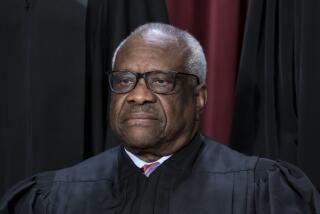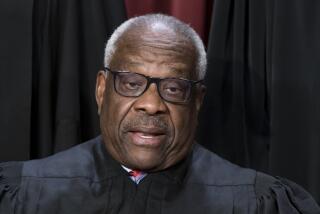Judge Returns to Job After Her Moment in Spotlight : Hearings: Susan J. Hoerchner was among those testifying on the Clarence Thomas nomination.
The stenciled sign on the door read, âJudge Hoerchner Dept. 7,â but the gray metal desk that serves as her âbenchâ in the small Workersâ Compensation Appeals Board courtroom in Norwalk was unoccupied.
Three lawyers sat at the Formica-topped attorneysâ tables, but one of them was unaware that the low-key, unobtrusive judge who was supposed to hear his case had recently appeared before millions in connection with the most controversial Supreme Court nomination in U.S. history.
Having just returned from Washington, where she served as a corroborating witness for her law school classmate, Anita F. Hill, Susan J. Hoerchner had taken the day off Tuesday.
Exhausted from traveling and five hours of questioning before the Senate Judiciary Committee, the judge said she had no regrets about backing up her friend.
âI was glad I was able to have a chance to tell what I knew,â she said in a telephone interview from her condominium in Whittier. âIt was a privilege to be able to appear in support of Anita.â
As one of four corroborating witnesses, Hoerchner, 47, testified Sunday that Hill had told her in a telephone conversation more than a decade ago that she was being sexually harassed by her boss. âThat boss was Clarence Thomas,â Hoerchner told the committee.
A quiet, cautious person who is unused to the limelight, the judge bristled at suggestions that she was part of a feminist, elitist conspiracy aimed at defeating the Thomas nomination. In a newspaper opinion piece Tuesday, Peggy Noonan, a former speech writer for Presidents Reagan and Bush, characterized her as a âprofessional, movement-y and intellectualishâ person who spoke for the âabstractâ America, as opposed to the ârealâ one.
A native of Chico and the daughter of a surveyor, Hoerchner was constantly on the move during her childhood, living in primitive conditions that included two log cabins. She attended 11 schools before she went to college. She earned a doctorate in American studies and taught college before attending law school.
While teaching at Emory University in Atlanta in 1968, she attended the Rev. Martin Luther King Jr.âs funeral but cannot remember participating in any causes since then.
At Yale Law School, where she and Hill became friends, she served on the board of directors for moot court--the student-run organization that stages mock appellate hearings--but otherwise maintained a âpretty low profile.â
Professors remember her as a reserved but very competent student. âShe made a very favorable impression,â said Prof. Burke Marshall. âI trust her completely.â
After law school, Hoerchner worked for the National Labor Relations Board in Washington and returned to California, where she briefly practiced law in San Francisco with a firm representing employers.
She taught law for a few years before joining the State Compensation Insurance Fund, a quasi-public agency. She became a $62,000-a-year workersâ compensation judge in August, 1990.
Although much of her background is in defense work, she is respected by lawyers who used to oppose her.
âSheâs very meticulous, very careful . . . ,â said Alfred Marotta, a Norwalk attorney who frequently appears before her. âShe was fair even as a defense attorney. She didnât pull any surprises on you.â
Hoerchnerâs husband of five years, Frederick W. Bray, describes her as a âvery moral person,â who worried about violating the judicial canon of ethics by appearing as a character witness and agreed to do only under subpoena.
Now that her face has been seen by millions of television viewers, she has been greeted by strangers on the street and has heard from people she has not seen in 20 years, her husband said. But the couple have not received any hostile telephone calls, and the experience has been less disruptive than might be expected, according to Bray.
For Hoerchner, the most troubling consequence of her appearance before the Judiciary Committee was the public disclosure by Sen. Alan Simpson (R-Wyo.) of sexual harassment charges against the former presiding judge of her court in Norwalk. Hoerchner and others corroborated the charges. A sealed settlement was reached and the judge has resigned.
âI regret the invasion of privacy in a matter that has been resolved,â Hoerchner said.
Times staff writer Carol Watson contributed to this story.
More to Read
Get the L.A. Times Politics newsletter
Deeply reported insights into legislation, politics and policy from Sacramento, Washington and beyond. In your inbox three times per week.
You may occasionally receive promotional content from the Los Angeles Times.










